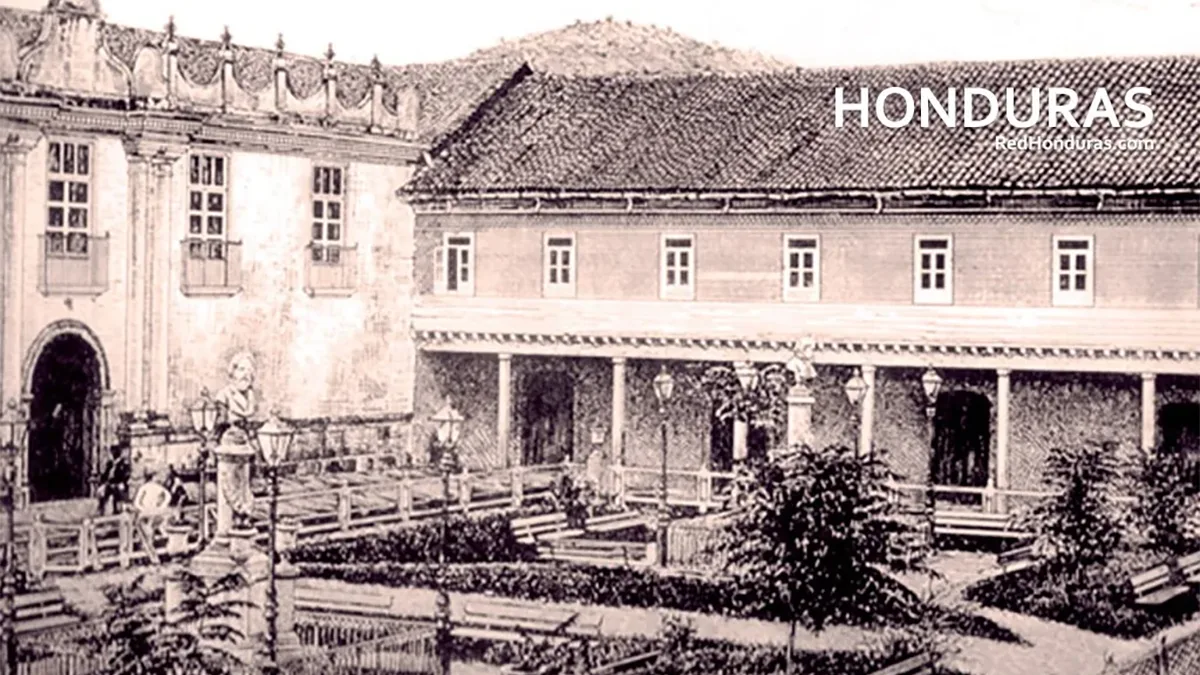Real Mines of the town of San Miguel de Heredia in Tegucigalpa

The city of Tegucigalpa was founded due to the immigration of miners who made their homes for the «silver vein» deposits that existed in the area and that were exploited approximately from the 16th century.
The Mexica name of Tegucigalpa means «silver hills» and it was founded by the Spanish Juan de la Cueva as the San Miguel de Heredia Mine on September 29, 1578 as a mining center, later obtaining the title of Villa de San Miguel de Heredia.

Colonial times
In colonial times, Tegucigalpa stood out for being a mining settlement where minerals were extracted from El Picacho hill and the town of San Juancito. Once Honduras gained independence from Spain, it shared with the city of Comayagua the title of capital of Honduras on several occasions.
In 1821 it was elevated to the rank of city. In 1824, the first congress of the Republic of Honduras decreed that the two main cities of the country would alternate as the capital of the State, but on October 30, 1880, by means of a decree being President of the country Dr. Marco Aurelio Soto, the seat of government was moved definitively to the city of Tegucigalpa as the state capital.
Central District Municipality
Since 1937, together with Comayagüela, they make up the Municipality of the Central District, sharing the political center of the nation.
The twin cities, as it is already known, are comprised of two twin cities Tegucigalpa and Comayagüela, which are connected by a masonry bridge with seven arches, built by Narciso Mallol, hence the name of the Mallol bridge.
Due to its great elevation above sea level, Tegucigalpa in past decades enjoyed an extremely pleasant climate, which is due to the fact that the capital is increasingly populated and with less water, as a result of the merciless cutting and burning of the forests. has changed a lot.
Cradle of illustrious Hondurans
Tegucigalpa has been the birthplace of illustrious patriots and statesmen such as: Juan Francisco Márquez, Francisco Morazán, José Trinidad Reyes, José Trinidad Cabañas, Juan Lindo, José Santos Guardiola, Marco Aurelio Soto, Ramón Rosa, Antonio R. Vallejo, Rómulo E. Durón, Juan Ramón Molina, Policarpo Bonilla, Augusto C. Coello, Adán Canales, among others.
Etymology of “Tegucigalpa”
According to the discussion about the origin of the word Tegucigalpa, the Guatemalan researcher, Favio Rodas N., formalized with two other opinions two men of Mexican studies, of great reputation, J. Ignacio Dávila Garibi and Alfredo Barrera Vásquez.
In this sense, it is detailed that there are two important facts in this etymological problem: the term Togogalpa, refers to «tototi», (bird in Nahuatl and Toncontín, a short distance from Tegucigalpa indicates «toncontin», another indisputable Nahuatlism, which is refers to a dance of the Mexican Indians.
In Mexico they have the belief that the word Tegucigalpa is of Nahuatl origin, but the etymologies that have been given are not very clear.
Some analysts today note that the first mayor of Tegucigalpa, Juan de la Cueva, never envisioned that the charming and picturesque city would become by this time the most important area in Honduras, and the political center where the main offices are located. of the State and the private sector.
Today Tegucigalpa is presenting a new face in terms of infrastructure, mainly in the current municipal administration.
DECLARATION OF THE CAPITAL OF HONDURAS
MARCO AURELIO SOTO,
Constitutional President of the Republic of Honduras
To its inhabitants know:That the National Constituent Assembly has issued the following:
DECREE No.11
The National Constituent Assembly,
Considering: that the city of Tegucigalpa meets the conditions and necessary elements of population and wealth, for the residence of the Government and of the Supreme Court of Justice and meeting of Congress: that the main war warehouse, the Mint, is located there i the National Printing Office, as well as the central revenue, telegraphic and postal offices; so,
Decrees:
Sole article.— The city of Tegucigalpa is declared, for now, Capital of the Republic.
Given in the Assembly Hall, in Tegucigalpa, on October 30, 1880.— To the Executive Power.Manuel Gamero, President (ANC)— Luis Bográn, Secretary.— Jerónimo Zelaya, Secretary.
THEREFORE: run.
Tegucigalpa, November 2, 1880.Marco A. Soto.
The Secretary of State in the Office of the Interior, Justice and Development, E. Gutierrez.
And by order of the President, please print and publish.—Gutierrez.


